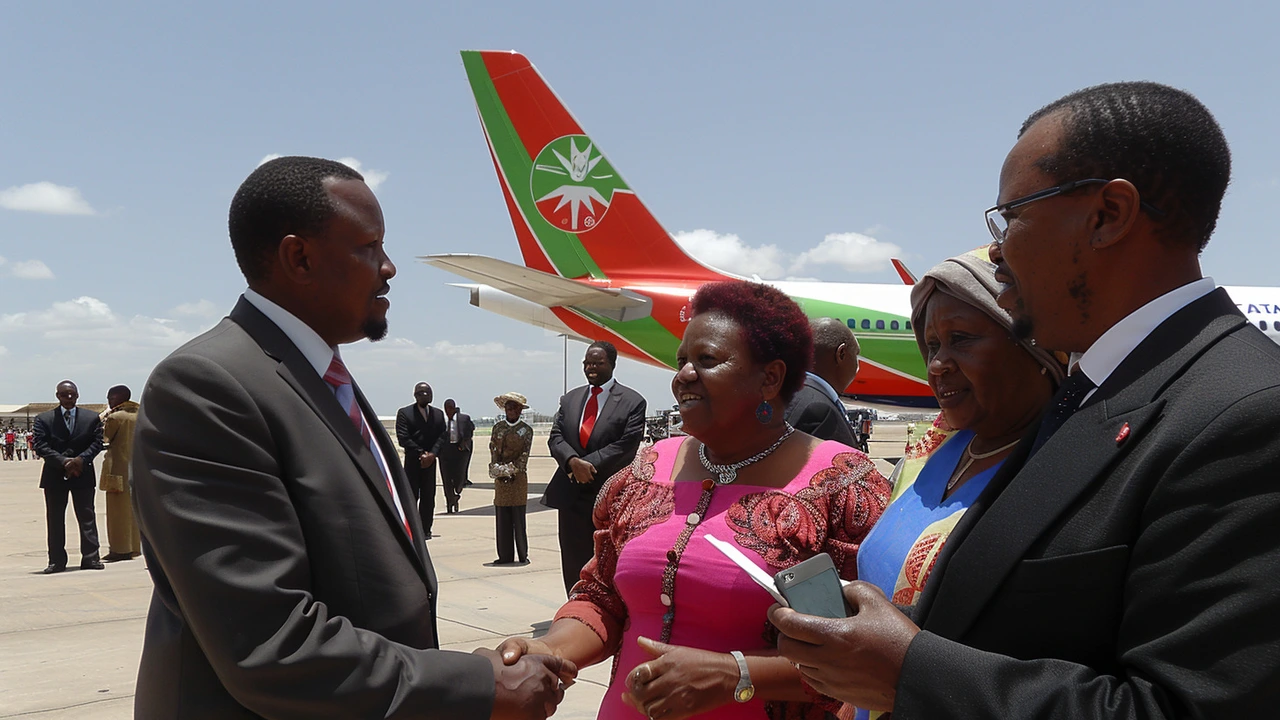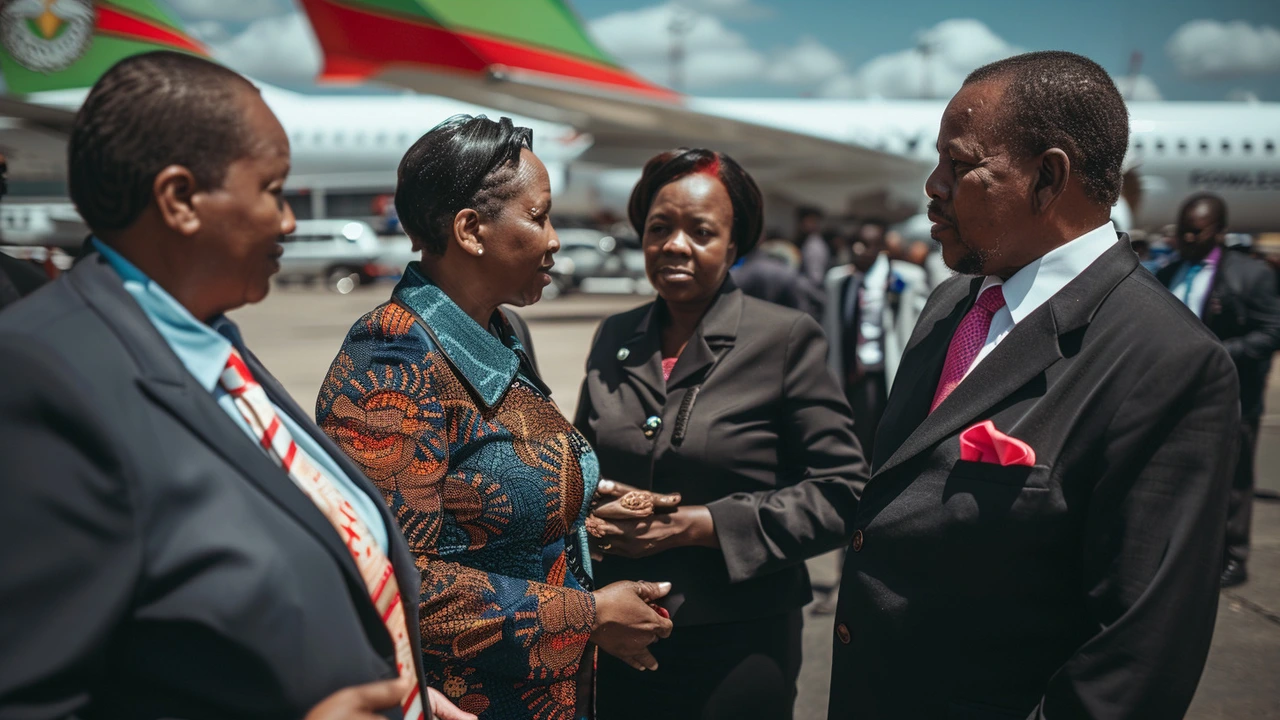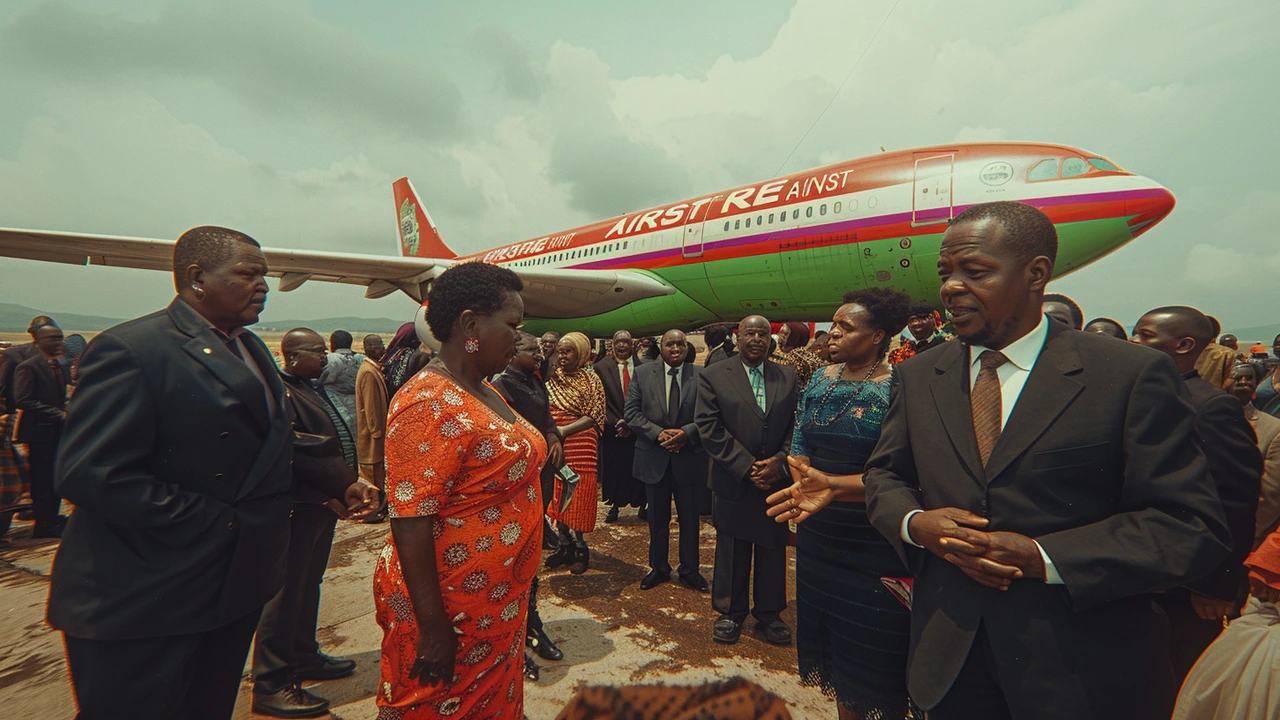Search Continues for Missing Military Plane in Malawi
In a turn of events that has gripped Malawi, an intensive search is currently underway for a missing military plane carrying Vice President Saulos Chilima and nine other individuals. The aircraft, which departed from the capital city of Lilongwe at 9:17 a.m. on Monday, was en route to Mzuzu International Airport. The plane never reached its destination, leading to a widespread search operation and a nation on edge.
The Journey and Initial Concerns
The flight's initial route seemed without issue, but shortly after takeoff, the plane encountered adverse weather conditions. According to air traffic control, the aircraft was directed away from its original path due to poor visibility. The last known communication with the plane occurred just before it disappeared from radar, causing immediate alarm. The aircraft was among the contingency attending the funeral of a former government minister, a solemn occasion that has now taken on a broader national significance.

The Missing and the Scope of the Search
Onboard the missing plane with Vice President Chilima were former first lady Shanil Dzimbiri and seven others, including three military crew members. The search operation has been exhaustive and complex, focusing particularly on a challenging 10-kilometer radius within a pine plantation in the Viphya mountain range near Mzuzu. The terrain, known for its dense forest and mountainous landscape, has posed significant challenges for rescue teams on the ground and in the air.
President Lazarus Chakwera, deeply concerned over the incident, has made it clear that no resources will be spared in the bid to locate the aircraft and rescue any potential survivors. His commitment underscores the critical nature of the situation and the importance of the passengers onboard.
International Aid and Cooperation
In a show of solidarity, countries including the U.S., U.K., Norway, and Israel have extended offers of assistance in the ongoing search operation. This international support has been pivotal, supplementing Malawi’s resources with advanced technology, expert personnel, and the requisite equipment to enhance the search and rescue efforts. The cooperation between these nations highlights a unified approach to a humanitarian crisis that transcends borders.

The Nation Holds Its Breath
Malawians are anxiously waiting for any news regarding the fate of the plane and its passengers. Vice President Chilima, a significant figure in Malawian politics since 2020, recently emerged from a legal ordeal when corruption charges against him were dropped. His presence on the flight has layered additional urgency and concern over the situation. The disappearance has not only sparked emotional responses from the public but also brought the country to the edge of its seat in anticipation of hopeful news.
The Road Ahead
The days ahead will be critical as search teams navigate the harsh terrain and unpredictable weather patterns in their pursuit. Each hour counts in situations of this nature, and the human element remains at the forefront of every effort. The collective hope is that the resilience and determination of the search teams, bolstered by international assistance, will culminate in a miraculous discovery of survivors.
As the story develops, one thing remains clear: Malawi, with its heart and soul invested in the safe return of its leaders, is demonstrating extraordinary human spirit and global solidarity. The nation's focus remains unwavering, and the prayers of millions reverberate both within and beyond its borders.

8 Comments
Jordan Bowens June 12 2024
Well, another drama in the skies and the overseas press will have a field day – the Viphya forest just turned into a dramatic set piece for every conspiracy theorist out there.
Kimberly Hickam June 13 2024
The disappearance of a state aircraft is never merely a news item; it is a crucible where geopolitics, technology, and human frailty converge.
One must first acknowledge that weather, an indifferent force, often masquerades as the villain while the deeper systemic issues hover unnoticed.
In Malawi's case, the reliance on aging fleets and limited radar coverage reflects a broader infrastructural neglect that transcends mere bad luck.
Meanwhile, the international assistance flood-while commendable-also reveals a subtle power dynamic where smaller nations become stages for larger players to showcase their humanitarian optics.
The Vice President's presence adds a political layer, turning a routine flight into a symbolic pilgrimage that the nation collectively invests its hopes into.
Yet hope, though potent, must be tempered with the harsh reality that dense pine forests are unforgiving, often swallowing signals like a void.
Technologically, the deployment of advanced search assets from the U.S., U.K., Norway, and Israel could be a double‑edged sword, offering precision at the cost of possible dependency.
Historically, similar mishaps have taught us that swift, transparent communication mitigates panic more effectively than any aerial drone.
Therefore, the government’s pledge to spare no resources is both a moral imperative and a political necessity, lest public confidence erode.
The families waiting at home deserve more than prayers; they deserve actionable updates that respect their dignity and the gravity of the situation.
Moreover, the international community should consider capacity‑building measures that leave Malawi better equipped for future challenges, not merely episodic rescue missions.
In the broader tapestry of African aviation safety, this incident may serve as a catalyst for regional cooperation and standardized protocols.
That said, we must not idolize the effort; scrutiny remains essential to ensure that funds and equipment are deployed efficiently.
Ultimately, the outcome-whether miraculous rescue or tragic loss-will be a testament to how humanity balances compassion with competence.
Until the forest yields its secret, we are left oscillating between optimism and dread, a state that any rational observer can understand.
Let this moment be a reminder that vigilance, investment, and humility are the true guardians of those who take to the skies.
Gift OLUWASANMI June 15 2024
Another feather in the cap of bureaucratic complacency, this fiasco showcases how fragile a system becomes when it forgets to modernize.
The fact that a high‑ranking official can vanish without a trace is a testament to the glaring gaps in flight safety oversight.
International aid will be lauded, yet one wonders if the same expertise is applied to prevent such tragedies in the first place.
Keith Craft June 16 2024
My heart breaks for the families, and the entire nation feels the tremor of this loss like a cold wind through an empty chapel.
Every moment without news feels like an eternity, and the anguish swells with each passing hour.
We must hold onto hope, but also demand every possible effort be made to bring them home.
The sky may be indifferent, but our collective spirit is not.
Kara Withers June 17 2024
For anyone looking for concrete steps, the Malawian authorities have shared their coordination channels with the foreign teams, and they are deploying thermal imaging drones along with ground search parties.
boy george June 18 2024
Sounds like a tough break.
Cheryl Dixon June 19 2024
It’s easy to point fingers at weather, but let’s not ignore the systemic underfunding that leaves pilots navigating with outdated equipment.
Still, we shouldn’t discount the bravery of the rescue crews on the ground.
Ramesh Modi June 20 2024
Indeed, the very notion of an "incident" is often painted with the brush of inevitability, yet, underneath, lies a tapestry of preventable oversights, bureaucratic inertia, and, frankly, a staggering disregard for safety protocols;
the international community must not merely applaud the rescue efforts, but also hold a mirror to the structural deficiencies that precipitated this tragedy, thereby demanding accountability, reform, and a steadfast commitment to future prevention.